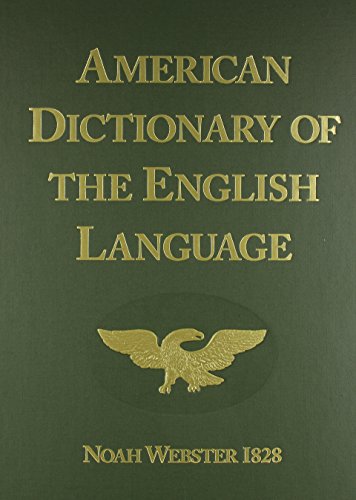American Dictionary of the English Language (1828 Facsimile Edition)
Noah Webster
BOOK REVIEW

In the vast tapestry of the English language, few works hold a candle to the illuminating brilliance of the American Dictionary of the English Language, a monumental piece forged by Noah Webster in 1828. This dictionary isn't just a comprehensive catalog of words; it embodies the very essence of a nation finding its identity through language. Webster's work is akin to a map of a new world, one where a burgeoning American culture stood on the brink of its own linguistic evolution.
As you delve into Webster's masterpiece, you don't merely read definitions; you embark on a journey through the corridors of history, culture, and identity. Each page, a testament to Webster's dedication, invites you to grasp not only the word itself but the intricate web of meaning it carries. The dictionary serves as a time capsule, where archaic terms meet the budding vernacular of the early 19th century. With over 70,000 entries, it's a cornucopia of erudition, ready to challenge your understanding and transform your vocabulary.
Webster was not just a lexicographer; he was a visionary. Rising from modest beginnings, he realized the profound importance of creating an American lexicon-one that would reflect the spirit and characteristics of a fledgling nation. As the United States sought to establish its independence, language became a powerful tool to assert that freedom. Webster's dictionary was instrumental in shaping a cohesive national identity amid splintering regional dialects. It resonated with the ideals of democracy, allowing ordinary citizens access to knowledge and eloquence that had previously been the privilege of the elite.
But who exactly did Webster inspire? Think of the literary giants that followed-Mark Twain, Emily Dickinson, and Walt Whitman-all weaving the rich tapestries of American English, each thread inextricably linked to Webster's groundwork. His work laid the foundation for a distinct American literary voice, one that would eventually echo across continents and influence writers and thinkers worldwide. The importance of restoring this lexicon of independence cannot be overstated; it is crucial in understanding how language shapes culture and how, in turn, it can empower individuals.
Critics may claim that American Dictionary of the English Language is a remnant devoid of modern relevance, an artifact frozen in time. However, that perspective falters in light of the dictionary's real impact. The complexities of language and the evolution of its meanings are ever-present, and understanding Webster's standards can illuminate the path of contemporary linguistic discourse. The authenticity of working from a basis rooted in history lends your words a strength and depth that's undeniable.
The sheer volume of reactions from readers over the years tells a story of its own. While some hail it as a cornerstone of American education and linguistics, others view it through a critical lens, questioning its approaches and definitions. Yet, there lies a beauty in this discord. Each opinion, each interpretation, sheds fresh light on the enduring battle between tradition and progress in linguistic development.
The context of when Webster crafted this dictionary cannot be overlooked. The year was 1828, a period rife with political upheaval and rapid social change. America was defining itself in the aftermath of the Revolutionary War, and language was a vital part of that discourse. Every word within this tome felt like a bullet fired towards establishing the very independence that Webster and many others fiercely advocated. Today, as discussions abound around cultural appropriation, linguistic justice, and identity, Webster's dictionary embodies themes that are just as pertinent now as they were two centuries ago.
Let this book speak to you as you turn its pages. Revel in the intoxicating power of language as it thrusts you into a world where the very breath of a nation invigorates each word. Your understanding of English will deepen, and with it, your connection to the very culture that shaped it. In the end, the American Dictionary of the English Language is not merely a reference; it is a beacon-one that illuminates the path of our shared linguistic heritage, beckoning you to grasp the profound beauty embedded within our words. 🌟
📖 American Dictionary of the English Language (1828 Facsimile Edition)
✍ by Noah Webster
🧾 2000 pages
1967
#american #dictionary #english #language #1828 #facsimile #edition #noah #webster #NoahWebster